Illinois's 4th congressional district
| Illinois's 4th congressional district | ||
|---|---|---|
.tif.png) | ||
| Current Representative | Luis Gutiérrez (D–Chicago) | |
| Area | 52 mi2 | |
| Distribution | 100.0% urban, 0.0% rural | |
| Population (2011 est.) | 737,025 | |
| Median income | $39,744 | |
| Ethnicity | 57.9% White, 3.9% Black, 2.3% Asian, 71.8% Hispanic, 0.2% Native American, 33.1% other | |
| Cook PVI | D+29[1][2] | |
The 4th Congressional District of Illinois includes part of Cook County, and has been represented by Democrat Luis Gutiérrez since January 1993.
It was featured by The Economist as one of the most strangely drawn and gerrymandered congressional districts in the country[3] and has been nicknamed "earmuffs" due to its shape.[4] It was created to pack two majority Hispanic parts of Chicago into one district.
This district covers two strips running east-west across the city of Chicago, Illinois on the west side continuing into smaller portions of some suburban areas in Cook County, surrounding Illinois' 7th congressional district. The northern portion is largely Puerto Rican, while the southern portion is heavily Mexican. The two sections are on opposite sides of the city and are only connected by a piece of Interstate 294 to the west; the highway is in the district while the surrounding areas are not. It is the smallest congressional district in area outside of New York City and San Francisco.[5]
Although today the 4th congressional district is one of the most Democratic in the nation, two of the most famous representatives to represent the 4th congressional district have been Republicans: Edward Derwinski, the first United States Secretary of Veterans Affairs, and Stephen A. Hurlbut, commander of the Army of the Gulf during the Civil War.
2011 redistricting
The district covers parts of Cook County, as of the 2011 redistricting which followed the 2010 census. All or parts of Berwyn, Brookfield, Chicago, Cicero, Lyons and Melrose Park are included.[6] The representatives for these districts were elected in the 2012 primary and general elections, and the boundaries became effective on January 3, 2013.
Elections
2012 election
Voting
| Election results from presidential races | ||
|---|---|---|
| Year | Office | Results |
| 2012 | President | Obama 81 – 17% Romney[2] |
| 2008 | President | Obama 81 – 18% McCain[2] |
| 2004 | President | Kerry 79 – 21% Bush |
| 2000 | President | Gore 76 – 19% Bush |
Geography
The 4th District includes the Chicago community of Brighton Park, in addition to almost all of Hermosa, Lower West Side and Gage Park; parts of Albany Park, Irving Park, Avondale, Logan Square, West Town, Humboldt Park, Belmont Cragin, Austin, McKinley Park, South Lawndale, New City, West Elsdon and Archer Heights; portions of riverfront Bridgeport; the portion of North Center southwest of Clybourn Avenue; and the northwestern tip of Lincoln Park.
History
The Illinois 4th Congressional District was originally formed in 1842. It included 17 counties, which were Cook, Lake, McHenry, Boone, De Kalb, Kane, Du Page, Will, Kendall, Grundy, La Salle, Bureau, Livingston, Iroquois, McLean, Vermilion and Champaign Counties. Beyond this Ford and Kankakee Counties were part of Vermillion and Iroquois Counties respectively at this point and thus in the district's boundaries.[7]
List of representatives
| Representative | Party | Years | District home | Notes |
|---|---|---|---|---|
| District created |
March 4, 1843 | |||
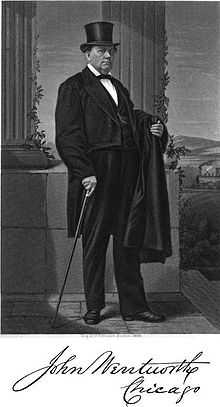 John Wentworth John Wentworth |
Democratic | March 4, 1843 – March 3, 1851 | ||
 Richard S. Molony Richard S. Molony |
Democratic | March 4, 1851 – March 3, 1853 | ||
 James Knox James Knox |
Whig | March 4, 1853 – March 3, 1855 | ||
| Opposition | March 4, 1855 – March 3, 1857 | |||
 William Kellogg William Kellogg |
Republican | March 4, 1857 – March 3, 1863 | ||
 Charles M. Harris Charles M. Harris |
Democratic | March 4, 1863 – March 3, 1865 | ||
| Abner C. Harding | Republican | March 4, 1865 – March 3, 1869 | ||
 John B. Hawley John B. Hawley |
Republican | March 4, 1869 – March 3, 1873 | Redistricted to the 6th district | |
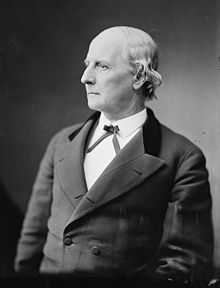 Stephen A. Hurlbut Stephen A. Hurlbut |
Republican | March 4, 1873 – March 3, 1877 | ||
 William Lathrop William Lathrop |
Republican | March 4, 1877 – March 3, 1879 | ||
 John C. Sherwin John C. Sherwin |
Republican | March 4, 1879 – March 3, 1883 | ||
 George E. Adams George E. Adams |
Republican | March 4, 1883 – March 3, 1891 | ||
 Walter C. Newberry Walter C. Newberry |
Democratic | March 4, 1891 – March 3, 1893 | ||
 Julius Goldzier Julius Goldzier |
Democratic | March 4, 1893 – March 3, 1895 | ||
 Charles W. Woodman Charles W. Woodman |
Republican | March 4, 1895 – March 3, 1897 | ||
 Daniel W. Mills Daniel W. Mills |
Republican | March 4, 1897 – March 3, 1899 | ||
 Thomas Cusack Thomas Cusack |
Democratic | March 4, 1899 – March 3, 1901 | ||
 James McAndrews James McAndrews |
Democratic | March 4, 1901 – March 3, 1903 | Redistricted to the 5th district | |
 George P. Foster George P. Foster |
Democratic | March 4, 1903 – March 3, 1905 | Redistricted from the 3rd district | |
 Charles S. Wharton Charles S. Wharton |
Republican | March 4, 1905 – March 3, 1907 | ||
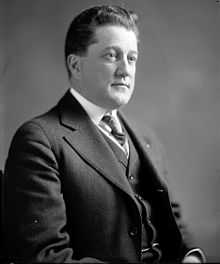 James T. McDermott James T. McDermott |
Democratic | March 4, 1907 – July 21, 1914 | Resigned | |
| Vacant |
July 21, 1914 – March 4, 1915 | |||
 James T. McDermott James T. McDermott |
Democratic | March 4, 1915 – March 3, 1917 | Re-elected to fill is own seat | |
 Charles Martin Charles Martin |
Democratic | March 4, 1917 – October 28, 1917 | Died | |
| Vacant |
October 28, 1917 – April 2, 1918 | |||
 John W. Rainey John W. Rainey |
Democratic | April 2, 1918 – May 4, 1923 | Died | |
| Vacant |
May 4, 1923 – November 6, 1923 | |||
 Thomas A. Doyle Thomas A. Doyle |
Democratic | November 6, 1923 – March 3, 1931 | ||
 Harry P. Beam Harry P. Beam |
Democratic | March 4, 1931 – December 6, 1942 | Resigned after being elected judge of the Municipal Court of Chicago | |
| Vacant |
December 6, 1942 – January 3, 1943 | |||
 Martin Gorski Martin Gorski |
Democratic | January 3, 1943 – January 3, 1949 | Redistricted to the 5th district | |
 James V. Buckley James V. Buckley |
Democratic | January 3, 1949 – January 3, 1951 | ||
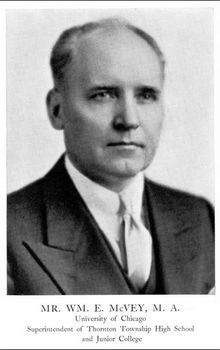 William E. McVey William E. McVey |
Republican | January 3, 1951 – August 10, 1958 | Died | |
| Vacant |
August 10, 1958 – January 3, 1959 | |||
 Ed Derwinski Ed Derwinski |
Republican | January 3, 1959 – January 3, 1983 | ||
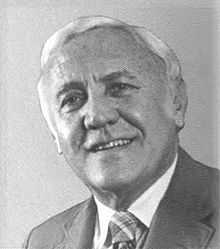 George M. O'Brien George M. O'Brien |
Republican | January 3, 1983 – July 17, 1986 | Redistricted from the 17th district, Died | |
| Vacant |
July 17, 1986 – January 3, 1987 | |||
 Jack Davis Jack Davis |
Republican | January 3, 1987 – January 3, 1989 | ||
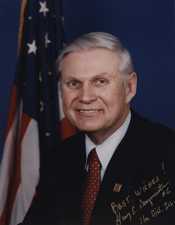 George E. Sangmeister George E. Sangmeister |
Democratic | January 3, 1989 – January 3, 1993 | Redistricted to the 11th district | |
 Luis Gutiérrez Luis Gutiérrez |
Democratic | January 3, 1993 – Present | Incumbent | |
Historical district boundaries

See also
- Illinois's congressional districts
- List of United States congressional districts
- United States House of Representatives elections in Illinois, 2008
- Gerrymandering
References
- ↑ "Partisan Voting Index Districts of the 113th Congress: 2004 & 2008" (PDF). The Cook Political Report. 2012. Retrieved 2013-01-10.
- ↑ 2.0 2.1 2.2 Barone, Michael; McCutcheon, Chuck (2013). The Almanac of American Politics 2014. Chicago: University of Chicago Press. ISBN 978-0-226-10544-4. Copyright National Journal.
- ↑ The Economist (April 25, 2002). "How to rig an election".
- ↑ Aaron Blake (July 27, 2011). "Name that district! (Gerrymandering edition)". Washington Post. Retrieved July 28, 2011.
- ↑ "Congressional Districts by Land Area (National)". United States Census Bureau. Archived from the original (ASCII TEXT) on 2009-08-16. Retrieved 2006-11-11.
- ↑ Illinois Congressional District 4, Illinois Board of Elections
- ↑ Parson, Stanley B., William W. Beach and Michael J. Durbin. United States Congressional Districts and Data, 1843–1883 (Westport: Greenwood Press, 1986) p. 9
- Martis, Kenneth C. (1989). The Historical Atlas of Political Parties in the United States Congress. New York: Macmillan Publishing Company.
- Martis, Kenneth C. (1982). The Historical Atlas of United States Congressional Districts. New York: Macmillan Publishing Company.
- Congressional Biographical Directory of the United States 1774–present
External links
- Washington Post page on the 4th District of Illinois
- U.S. Census Bureau – 4th District Fact Sheet
- U.S. Census Bureau – 4th District map PDF (1.12 MiB)
| ||||||
Coordinates: 41°49′55″N 87°42′36″W / 41.83194°N 87.71000°W